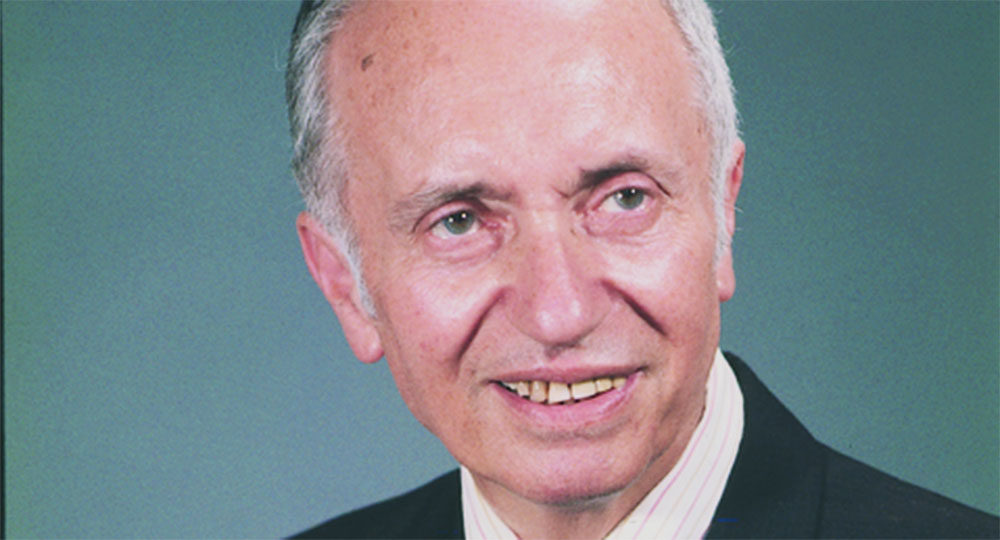After a Half Century
On May 2, 1922—half a century ago—an 18-year old Jewish lad made his confession of faith in Jesus as Messiah and Savior in a small chapel in Warsaw, Poland, in the presence of an assembly of Christian Jews and others. Most of these people have now gone to be with the Lord—very few survive. Some died a violent and cruel death at the hands of the Nazis. The very place where this confession was made was razed to the ground during the Hitler Holocaust. Gone are my loved ones; gone is the city and land of my youth. What has survived is a memory, frail and transient, burning in my mind.
Now that 50 years have passed, someone might ask “Was it worthwhile to become a Christian? Was it worth paying the price of isolation from your own kith and kin, to become an exile among your own people, to live between two worlds, to walk the lone path of that peculiar being which is a Jewish Christian, a stranger to the Jews and a mystery to the Gentiles? Is the spiritual satisfaction such as to compensate for the sense of loss?”
Those are fair questions, and I am persuaded that I owe it to myself, to my numerous friends, and to those who will read this “apologia” to give a fair and reasonable answer.
Yes, I was young indeed. What does a boy of 18 know of himself, of life, of the world around him, or of the consequences of so decisive a step? Wasn’t I too young and immature to make such an irreversible decision?
But then again, let us for a moment look beyond one called Victor Buksbazen. Mine was not an isolated case. There were others who, at a tender age, heard God speak to them and obeyed.
We are apt to think of the prophets as old and venerable graybeards. What about Isaiah and Amos, Hosea and Jeremiah? All of them were young men, just emerging from their boyhood.
Undoubtedly that sudden realization of one’s own unworthiness and sinfulness, that sense of being lost, and the awareness of a holy God—in one word, what people call “conversion”—sometimes comes to older men and women, but it mostly comes to the young. It comes when the world and its pitiful wisdom and unnerving experiences have not yet molded us rigidly in their own pattern and enslaved us in their ruts.
Yes, it takes youth, inexperience, impulsiveness, to dare to obey the voice of God. So much for my youth.
But how did it all happen, and why? Let me tell you the story, and you may draw your own conclusions.
My Mother
I was born in 1903. My mother was like many other millions of Jewish mothers, raising her family, looking after her household, loving her husband and her children in her own rather shortsighted way. Beyond her domestic responsibilities, she saw and knew little. Her family was her domain, and the city limits of Warsaw were the outer boundaries of her world.
My Father
Father, however, was a completely different personality. Seldom have I met others who match his stature in integrity, inner beauty, and spiritual discernment. He was neither Orthodox nor Reform. I would find it hard to classify him. Perhaps the closest description would be that Jewish term misnaged; that is, a Jew who was a Protestant at heart. He protested against the deadening ways of a stultifying and ossified ritualism. Thoroughly conversant with Rabbinical Judaism, he also possessed a good secular education, something that was not too common among Polish Jews at the turn of the century.
He possessed that fine critical faculty (or was it intuition?) that enabled him to sift the chaff from the wheat and to preserve in his heart that which was worthwhile, life giving, and life preserving.
By profession he was a cardboard box maker. This was his way of making a living—and not too profitable a one at that. But his real life interest, his passions, were two—an eternal quest for truth and a fervent love of music. Come to think of it, the two were really one. He was an unusually accomplished musician, both in his knowledge of instruments and in the theory of music. My childhood home was full of young Jewish lovers of music whom my father would instruct in the ways of music, teaching them solfeggio and how to play the piano, guitar, mandolin, and a variety of other instruments. The more advanced students he would instruct in the theory and harmony of music. At home there would sometimes be a shortage of bread or other daily necessities, but of music, never.
A Passion for God
But what really captivated his heart, mind, and soul was a passion for God. Never a formal religionist, he had a deep appreciation and intuition for things spiritual. His quest, that inward hunger of his soul, inevitably led him to the study of the New Testament. There the radiant personality of Jesus captivated him.
Like other Jews, my father was, early in life, inoculated with anti-Christian toxin. Wasn’t Christianity responsible for all the Jewish suffering and the exiles from a thousand places, for the persecutions, for the rivers of blood and tears? And wasn’t Jesus at the bottom of it all?
But in reading the New Testament, my father met with the real Christ, who was so different from anything he had ever heard or imagined. In Him he found the love of God in its undiluted holiness and beauty. This Jesus could not be both, my father reasoned—the caricature of Jewish legends and fantasies, and also the Son of God sent from Heaven to save His people and all men from darkness and sin. He decided that the Christ of the New Testament was real, and the Yeshu of Jewish fiction was an unworthy perversion.
It was this Christ whom my father communicated to his son. I was indeed too young to understand or take in the import of what I heard from my father. But it was a communication that conditioned my mind, not in bitterness and prejudice, but with an openness and an ability to understand and love the Jesus of the New Testament.
And then, after all, I was my father’s son, wasn’t I?
Early Training
At the age of five I went to Cheder (religious school). My father wanted me to know as much as possible about Judaism. I excelled in the study of Chumesh (the five books of Moses) and in the commentaries, the Targum, Rashi and others. Whenever there was an examination or inspection by a member of the school board who wanted to gauge the knowledge of the students, yours truly was among the bright boys put forward by the rabbi so that they might reflect credit on the school.
Half a day I would go to Cheder and half a day to secular public school, for my father did not want my education to be one-sided. Sometimes the boys at Cheder would sneer and call me “a half-day student.” But I remember the rabbi coming to my defense and saying “I wish you boys would learn as much in a whole day as he does in a half day.” This I say not boastfully, but merely to suggest that I was not raised in a religious or intellectual void.
For a time I even attended the Yeshiva, the institute of higher Jewish training, where I studied the Talmud and such weighty questions as, what fines were due when an ox gored a man and to whom should they be paid? Or, what should be done if two men caught hold of a garment, both claiming the find? Whose shall it be? I must admit that these important matters somehow left me singularly hollow and disinterested. Neither could I whip up a whole lot of enthusiasm for the weighty discussion of what shall be done with an egg that was laid on the Sabbath. Was it kosher or treff (not conforming to dietary laws)? My mind wandered, and my soul drifted from religious adherence.
Around me were pressing events of war, social upheaval, cruelty, and that peculiar and ever-present Jewish problem of anti-Semitism. Somehow the religious observances and rites of my people seemed to have no answer and no relevance to all this. My elders, as well as the youth of my generation, felt the inadequacy, the triteness of their religious upbringing, and they rebelled against it.
The First World War, with its misery and anguish, hunger and suffering, swept away whatever security I, as a child, possessed. My father was called up for military service in the Russian army. He came back a man physically broken. He died in 1920 during the postwar epidemics.
But in the few years that I enjoyed his paternal guidance and fellowship, he talked to me often about the Lord Jesus. Deep in my heart there was a growing admiration for the one who captivated the mind and love of my father.
A Last Will
Shortly before my father died, he committed to me the care of my mother and two younger sisters. I was only 17 years old at the time. He also said to me, “You are young and free. If you ever reach the conviction that Jesus is the true Messiah and your Savior, then do not hesitate to make an open confession of Him. I was held back from this by your mother, who threatened to divorce me and take you children away if I should openly follow Him. Let nobody or anything divert you from the path of faith and conviction; follow the inner voice.” He died shortly after that.
A Midnight Call
The same Jesus who touched the heart of my father and captivated his mind and soul was speaking to me in a mighty way. It was a winter night in Warsaw, Poland. It was midnight, and a teenager stood near a small oil lamp with a tiny flickering light, reading entranced with the Gospel of Matthew. It was then that I felt a shiver go through my whole being, a sense of the nearness, the very presence of God in Christ. In the glimmer of that flickering light, I saw clearly the one who declared, “I am the light of the world” (Jn. 8:12). Perhaps this experience was similar to Isaiah’s, some 27 centuries before in the Temple of Jerusalem. I do not know, but it was then that I gave my heart to Jesus.
Fifty Years
Half a century of my life with Christ has now passed. As I look back upon those years, I trace with wonder the hand of God who guided me even in my earliest days. Why should my life have been spared in infancy? Why, of all the millions of Jews in Europe who died without the knowledge of the Messiah Jesus, did my father come across a New Testament? Why did he speak to me about Him? Why did I survive in the midst of a battle between the Polish armies and the Bolsheviks, with my father and me caught in the middle? Why should I have been spared amidst the terrors of two world wars or the dangerous passage across the ocean to the USA when enemy submarines were lurking in the deep? Why should Jesus have spoken to my heart as He did?
Perhaps God’s Word to Jeremiah holds the answers to these questions: “Before I formed thee in the womb, I knew thee; and before thou camest forth out of the womb, I sanctified thee, and I ordained thee a prophet unto the nations” (Jer. 1:5). Or perhaps the declaration of our God’s supreme sovereignty might apply here: “I will be gracious, and will show mercy on whom I will show mercy” (Ex. 33:19). Our God is a sovereign God.
I look back upon my life. Many and terrible things have happened since that memorable day when I confessed Christ. But all of it was designed to draw me closer to my God and Savior.
My loved ones died in the satanic extermination camps of Hitler. Some were swallowed up behind the Iron Curtain, never to be heard of again. As for me, undeserving as I am, God has led me by the hand from place to place, always opening doors of greater service, usefulness, and blessings for my people.
One of the greatest blessings in my life was to meet, in 1935 in London, England, Lydia Sitenhof—a gifted young Hebrew Christian. When we became engaged, she came over to Poland, where I was superintendent of a mission station and where I had hoped to get married and continue my ministry. But Lydia, who we now feel sure was led by the Lord, sensed the gathering storm of Hitler and that Poland would be one of the first victims of his madness. She therefore counseled that I leave Poland, which, by the grace of God, I did in 1937. We were then married in England.
Since then she has been my loving and faithful companion, helper, and encourager. We have joined hands and hearts in His service, and the Lord has blessed and used us. Through our books and writings, we were privileged to make what we hope will be an enduring contribution to the cause of Christ among His people, the Jews.
Not that we were spared the lashes of the storm. God does not promise smooth sailing for His children. There were times of agony, times of trial and peril of every kind. My boat was literally tossed hither and thither, but inside the frail vessel my Lord was present, saying “In the world ye shall have tribulation: but be of good cheer; I have overcome the world” (Jn. 16:33).
Some of the years of my life were years of preparation in all kinds of schools and institutions of learning. But the training that I cherish most was that which I received directly from my Savior when I meditated upon His Word, and also that which I received in that excellent school known as “the college of hard knocks.”
Imperfect and unworthy as I am, the Lord has condescended to use me as an instrument of uplift and blessing to thousands of my Jewish brethren in distress of body and travail of heart. It has pleased Him to use me as a witness among my people by word of mouth or through my pen, writing publishing, proclaiming and defending the Word of God.
About half a century has passed in the service of my Lord, the last 30 years as General Secretary of The Friends of Israel Missionary and Relief Society. My field has become as wide as the world. Wherever my brethren suffer anguish of soul or distress of body, it has been my privilege to serve them. It is no small matter to know that because of this, thousands of burdens have been lifted, the pangs of hunger of multitudes across the oceans and continents were stilled, and the light of Christ has shone into the hearts of people who too long sat in darkness.
It is my earnest hope and prayer that one day when I face my Master, He will say, “Well done, thou good and faithful servant” (Mt. 25:21). This will be the supreme reward.
You ask me, “Was it worth spending all these years with Christ?” I have told you my story as best I knew how. You be the judge.








